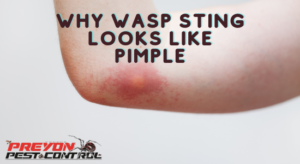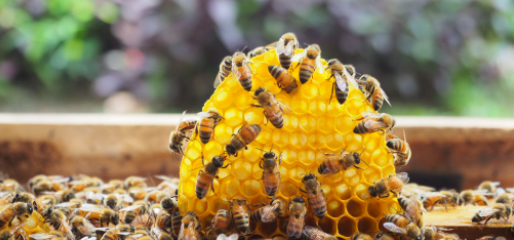Would you know if you were stung by a bee, wasp, yellow jacket, hornet, or fire ant if you were stung? These are the bug stings that most frequently cause allergic reactions. The majority of people are not allergic. By understanding the distinction, you can determine whether you require medical attention.

Three Different Types of Reactions
The degree of sting-related symptoms varies by individual. However, in general:
- A natural reaction causes pain, swelling, and redness in the area of the sting.
- Swelling that goes beyond the sting site is a sign of a severe local reaction. For instance, a person stung on the ankle may have edema throughout the leg. While it frequently appears scary, it is usually nothing more than a normal reaction. Localized reactions of this magnitude peak after around 48 hours and then gradually improve over the next 5 to 10 days.
The most dangerous reaction is one caused by an allergen (described below). You must get treatment immediately.
What Are the Symptoms of an Allergy to Wasp Sting?
A minor allergic reaction may manifest itself in one or more of the following symptoms at the stung site:
- Pain
- Redness
- Acne-like pimples
- Swelling that is mild to moderate
- Warmth
- Itching
Severe allergic reactions (also known as anaphylaxis) are uncommon. However, when they occur, they are considered emergencies.
Symptoms may include the following:
- Breathing difficulties
- Hives that manifest as a red, itchy rash and spread to regions not directly affected by the sting
- Face, throat, or any area of the mouth or tongue swelling
- Excessive wheezing or difficulty swallowing
- Anxiety and restlessness
- Pulse that is rapid
- Disorientation or a precipitous drop in blood pressure
- Constipation, nausea, or diarrhea
How Common Are Allergies to Wasp Sting?
Around 2 million Americans are allergic to stinging bug venom. You may also be allergic to yellow jackets, wasps, and hornets if you are sensitive to bee stings. Many of these individuals are in danger of fatal allergic responses. Why do wasp sting look like pimples?
If You Are Not Allergic
- To begin, if you have been stung on the hand, immediately remove any rings from your fingers.
- When a bee stings you, the bee normally leaves a venom sac and a stinger on your skin. Remove the stinger immediately to avoid absorbing additional venom.
- With a fingernail or a stiff-edged instrument such as a credit card, scrape out the sac and stinger gently.
- Avoid squeezing the sac or pulling on the stinger, since this will allow more venom to enter your body.
- Soap and rinse the stung area, then apply an antiseptic.
- Apply a soothing ointment, such as hydrocortisone cream or calamine lotion, to the area and bandage it dry and sterile.
- Apply an ice pack or cold compress to the region if swelling is an issue.
- To alleviate itching, swelling, and hives, take an over-the-counter oral antihistamine. Give this medication to children under the age of two or pregnant women only if your doctor approves. (If you are pregnant, it is best to see your physician before taking any medication.)
- Additionally, you might take a nonsteroidal anti-inflammatory drug (NSAID) such as ibuprofen.
- Before taking any medication, carefully read the label. If parents of children or persons with medical issues have questions about the use of a medication, they should consult a pharmacist.
Treatment for Allergic Reactions
If you have a severe allergic reaction to a sting, you will require epinephrine, which you can self-inject before calling 911. Typically, this shot will avert a more severe allergic reaction. Even if the symptoms appear to resolve, you will require immediate medical assistance. You may be required to spend the night in the hospital. If you’ve ever experienced an allergic reaction to an insect bite, always carry epinephrine with you. Whenever you get a wasp sting contact the best wasps exterminator for incredible services and prevent yourself from getting wasp stings in the future.
How Can I Stay Away From Being Stung?
You cannot do so entirely. However, these measures make it less likely.
- Acquire the ability to identify and avoid insect nests. Yellowjackets build nests in dirt mounds, old logs, and walls. Honeybees make their home in beehives. Hornets and wasps nest in bushes, trees, and structures.
- When outdoors, wear shoes and socks.
- When in rural or wooded locations, wear long-sleeved shirts, long pants, socks, and shoes.
- Avoid wearing perfumes or garments with vivid colors. They have a proclivity for attracting insects.
- If you have severe allergies, always bring someone with you when hiking, boating, swimming, golfing, or doing other outdoor activities.
- Consider installing screens on your home’s windows and doors. When you’re outside, you may also wish to use bug repellents.
- The insecticide should be sprayed on garbage cans on a regular basis, and the cans should be covered.
- Avoid or eliminate plants and vines that attract insects that grow in and around the residence.
Additionally, if you are highly allergic, you should constantly wear identification indicating your sensitivity. As well, keep an epinephrine kit on hand in the event of an emergency.
What Are Self-Administered Kits?
These allow you to administer medication to yourself immediately after being stung, prior to seeking medical attention. You should still seek medical attention immediately after being stung. To purchase one of the kits, you will need a prescription from your physician. Always keep two with you. Inform your doctor about all medications you use to avoid drug interactions.
How Do I Avoid Allergic Reactions?
Allergy injections may be beneficial. They are around 97% effective. Allergy shots for insect stings gradually introduce trace amounts of the allergen (which you may hear referred to as bug venom) into your body. Your body becomes accustomed to the allergen, and the next time you are stung, you will not have such a severe reaction.
Your doctor will first do an allergy test to determine which insects you are allergic to. Following that, you’ll normally receive injections once or twice a week. The dose will gradually increase until you achieve a maintenance dose, which typically occurs after around 3 to 6 months.
Allergy injections are generally considered safe for the majority of people. You may experience injection site redness and warmth. Additionally, you may experience a minor or severe adverse reaction to the shot itself. They may be especially dangerous for individuals with heart or lung illness or who are on certain drugs.
Prey on pest control is offering the best service for wasp removal in Chicago. Because sometimes wasp stings cause diarrhea that might be difficult to treat so before getting any health problem from wasps you can call us at 708-400-0101.



